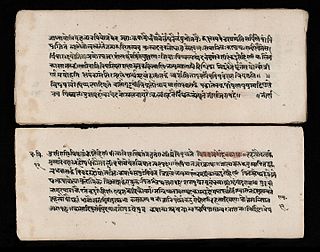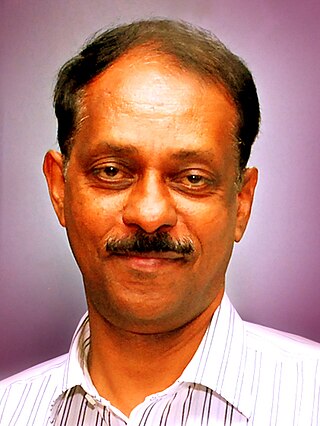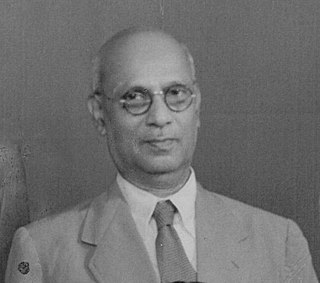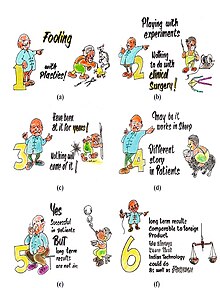
Ayurveda is an alternative medicine system with historical roots in the Indian subcontinent. It is heavily practiced in India and Nepal, where around 80% of the population report using ayurveda. The theory and practice of ayurveda is pseudoscientific.
M. Krishnan Nair was an Indian oncologist. He was the founding director of the Regional Cancer Centre, Thiruvananthapuram, a director of the S.U.T. Institute of Oncology, and Trivandrum Cancer Center(TCC), part of SUT Royal Hospital in Thiruvananthapuram (Trivandrum) and a professor at the Amrita Institute of Medical Sciences & Research in Kochi. The Government of India awarded him the fourth highest civilian award of the Padma Shri in 2001 for his contributions in the cancer care field.
A samskara is a process in ayurvedic medicine said to detoxify heavy metals and toxic herbs.

The Charaka Samhita is a Sanskrit text on Ayurveda. Along with the Sushruta Samhita, it is one of the two foundational texts of this field that have survived from ancient India. It is one of the three works that constitute the Brhat Trayi.

Sree Chitra Tirunal Institute for Medical Sciences and Technology (SCTIMST), formerly Sree Chitra Tirunal Medical Center, is an autonomous medical school and an Institute of National Importance in India established in 1976 at Thiruvananthapuram, Kerala. The institute is named after Chithira Tirunal Balarama Varma, the last Maharajah of Travancore, who gifted the building. The institute is under the Administrative Control of the Department of Science and Technology, Government of India. SCTIMST is one of the most prominent research Institutes and centers in India.

K. M. Cherian, in full Kotturathu Mammen Cherian, is an Indian heart surgeon. He performed India's first coronary artery bypass surgery and first heart Lung transplant. and is considered a pioneer of pediatric cardiac surgery in the country. He is also a former honorary surgeon to the President of India and a Padma Shri awardee.

Siddha medicine is a form of traditional medicine originating in southern India. It is one of the oldest systems of medicine in India.

The Government Medical College, Thiruvananthapuram is in Thiruvananthapuram, India. Founded in 1951, it was inaugurated by Prime Minister Jawaharlal Nehru and is Kerala's first ever Medical College.
The Ministry of Ayush, a ministry of the Government of India, is responsible for developing education, research and propagation of traditional medicine systems in India. Ayush is a name devised from the names of the alternative healthcare systems covered by the ministry: Ayurveda, Yoga & Naturopathy, Unani, Siddha, Sowa Rigpa, and Homeopathy.

Vaidyaratnam Oushadhasala is an Ayurvedic Pharmaceutical company situated in Thaikkattussery, near Ollur. It is managed by Thaikkattusseri Eledathu Thaikkattu Family, one among the Ashtavaidya families of Kerala. Vaidyaratnam runs a NABH accredited nursing home by name Vaidyaratnam Nursing Home and an Ayurvedic Medical College apart from two ISO certified manufacturing plants in Thrissur and an R&D centre in Thaikkattussery, under the flagship of Vaidyaratnam. .
Eledath Thaikkattu Narayanan Mooss was an Ayurvedic physician and the Chief Physician and Managing Partner of Vaidyaratnam Oushadhasala. He was awarded the Padma Bhushan in 2010 for his contribution to the field of medicine specific to Ayurveda.

Dr. Aikara Varkey George is an environmental scientist, teacher and social activist from India.
J. Hareendran Nair is an Indian Ayurveda practitioner and entrepreneur from Kerala. He is the founder of Pankajakasthuri Herbals, This is a business group that contributed to the promotion and popularising of Ayurveda and ayurvedic products across the country. The Government of India, in 2012, honoured him with Padma Shri for his services to the cause of Ayurveda.
Rajagopalan Krishnan Vaidyan was an Indian ayurvedic practitioner from the Indian state of Kerala and the president of the Association of Ayurvedic Physicians of Kerala.

Dr. L. A. Ravi Varma, was a historian, ophthalmologist and philosopher of the 20th century in Kerala, India. He was a critical figure who enriched the Ayurvedic literature contributing to its renaissance. In January 1940, he was appointed as Director of the joint Oriental Manuscripts Libraries of the Government of Kerala and the Kerala University. He was conferred the Honorary Title of Vaidyashastra Nipunan and Gaveshana Thillakan by Chithira Thirunal Maharaja, the King of Travancore, Kerala, India.

Kodethur Narasimha Udupa (1920–1992) was an Indian surgeon, medical administrator, a pioneer of integrative medicine and the founder director of the Institute of Medical Sciences, Banaras Hindu University (BHU). Born in Udupi in the South Indian state of Karnataka, His father was Tamayya Udupa scholar in Sanskrit and Jyotish belonging to Shivalli brahmin community. He passed his bachelor's degree in Ayurvedic Medicine (AMS) from Banares Hindu University, secured his master's degree (MS) from the University of Michigan in 1948 and passed FRCS examination from Canada.
P. R. Krishna Kumar was an Indian Ayurveda expert and managing director of The Arya Vaidya Pharmacy (Coimbatore) Ltd. He founded the AVP Research Foundation, a non-profit organisation promoting research in the Ayurveda. He was the chancellor of the Avinashilingam University, and the chairman of CARe Keralam, a resource centre involved in efforts to standardise Ayurvedic medicines. The Government of India awarded him the fourth-highest civilian honour of the Padma Shri, in 2009, for his contributions to Ayurveda.
Shantilal Jamnadas Mehta (1905–1997) was an Indian surgeon, institution builder and medical academic, who established the Jaslok Hospital and Research Centre, Mumbai. His contributions were also reported in the establishment of Tata Memorial Centre and the All India Institute of Medical Sciences, Delhi. In 1971, the Government of India awarded him the third highest civilian honour of the Padma Bhushan for his contributions to medicine.
Ram Harsh Singh is an Indian practitioner of the Ayurveda system of alternative medicine and the founder vice chancellor of Dr. Sarvepalli Radhakrishnan Rajasthan Ayurved University. An Emeritus Professor of Banaras Hindu University and a National Professor of the Ministry of AYUSH of the Government of India, he was conferred with the fourth highest civilian honour of Padma Shri, in 2016.
Kurupath Radhakrishnan is an Indian neurologist and epileptologist, who has established R Madhavan Nayar Center for Comprehensive Epilepsy Care, (RMNC) at Sree Chitra Tirunal Institute of Medical Sciences and Technology (SCTIMST) Thiruvananthapuram, India. He has contributed for the resurgence of epilepsy surgery in India during 1990s, after the decline in 1970s. He also served as the director of SCTIMST from 2009 - 2013. After his retirement he worked at the Department of Neurology, Kasturba Medical College, Manipal Academy of Higher Education, Manipal, Karnataka, India; and at the Department of Neurology, Amrita Advanced Epilepsy Center, Amrita Institute of Medical Sciences, Cochin, Kerala, India. Currently he is working as a senior Consultant, Department of Neurosciences, Avitis Institute of Medical Sciences, Nemmara, Palakkad, Kerala, India.













